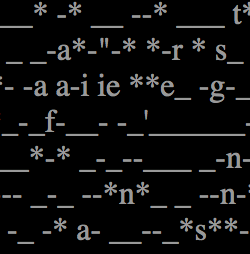“Degenerative and regenerative” by Tiselli, was a longer term project, that was entirely dependent on the interactions. The webpage featured text that would “degenerate” with every visit. Within days, the text became unreadable. I took this piece as a commentary on value and importance. Although degenerated and unreadable, the piece still had conveyed something. It seemed to comment on the idea of network writing in itself. Was there importance in the net language, or was all importance and meaning degenerated?
“The Fall of the Site of Marsha”, by Rob wittig, and “MEZZANGELLE”, by Mez Breeze, seem to further this point of importance. Although a bit more legible than “degenerative and regenerative”, these pieces still highlight the importance and meaning that can be held by net language.
“The Fall of the Site of Marsha”, tells a story of a fallen woman to “angels”, and even contains an affair storyline. How can such an advanced story be portrayed by so little text?
“Blue Company”, also by Robb Wittig, tells a story with more text. While this story line contains more text details than that of “The Fall of the Site of Marsha”, they are both similar in the level of story given. This goes to show, that the amount or straightforwardness of text, is not always needed to portray a complicated story line. Although both of these pieces leave holes for the interactor to fill in, I found more interest in the storyline of, “The Fall of Marsha”. It left much more to be desired, which really reeled me in.
“heyharryheymatilda”, by Rachel Hulin, was also very text and image heavy. I found it very interesting how this piece used Instagram to portray the story. I still though, found much more interest in the more abstract pieces, then these filled out novels.
I was also very interested in, “The Listeners”, by John Cayley. I found it interesting how this piece strayed a bit farther away from net language, and focused on another aspect of human engagement with the net. This piece was a critique on human interaction with the net, and was portrayed through an audio conversation of a man with an “Amazon Alexa”. As someone who uses an “Amazon Alexa” daily, I found it incredibly interesting how this piece played out. I also found the commentary on our reliance with the sociability through these networks incredibly interesting.
“I love Alaska” seemed to have a similar commentary, as it follows the search history of a middle aged woman in a sexually dissatisfying relationship. The story progresses to her finding lovers in chat rooms, and eventually cheating on her husband with one of these chat room members. It seems to be a commentary on our dissatisfaction with our real world circumstances, and how our online networks can provide us with exploration and a sense of satisfaction in what isn’t real.
All of these pieces seem to provide almost a dreamscape, and highlight the other reality that is our online networks. I fully enjoyed all of these pieces.
